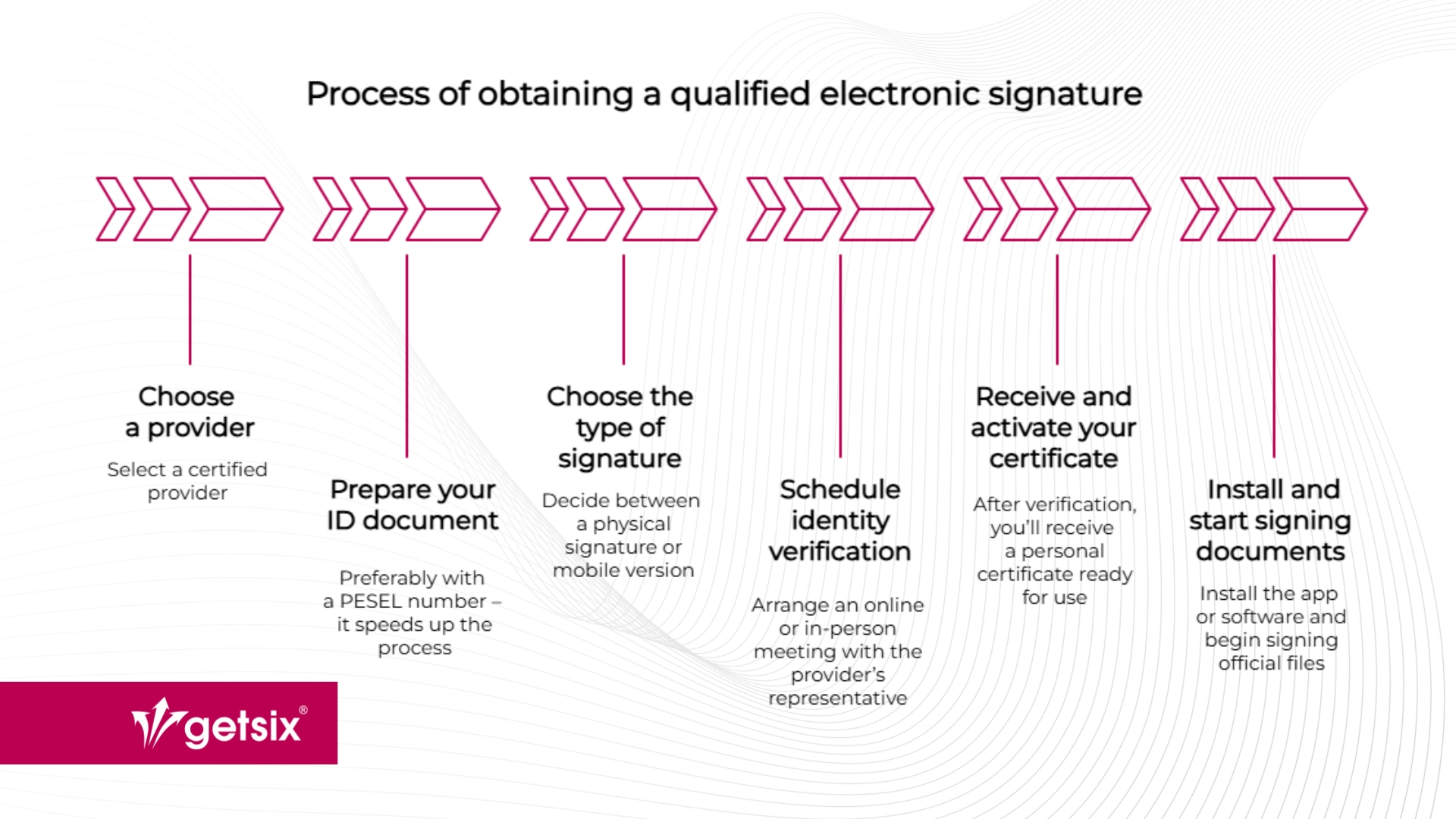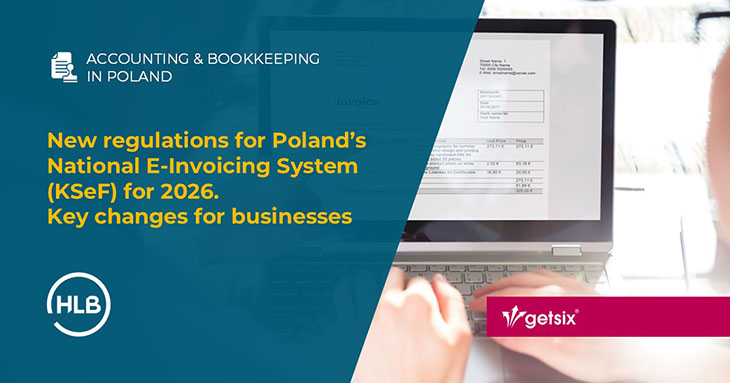Qualified electronic signature in Poland
More and more companies in Poland are switching to a digital document workflow. One of the key elements of this transformation is the qualified electronic signature – a tool that enables secure and legally compliant signing of contracts, applications and official correspondence, regardless of your location.
Thanks to a qualified electronic signature, entrepreneurs save time, reduce costs, and eliminate the need to print and send documents in paper form. Importantly, for foreign owners and boards of companies operating in Poland, the qualified electronic signature is an absolutely essential tool for conducting business in accordance with the law.
This article explains what an electronic signature is, what types exist, and how to obtain one quickly and seamlessly.
What is an electronic signature?
An electronic signature is data in digital form that is attached to or logically associated with an electronic document, intended to confirm its authenticity and the identity of the signer. It is the digital equivalent of a handwritten signature – with the difference that it is made on a computer or smartphone screen, not on paper.
In Poland, electronic signatures are strictly regulated by the Act on Trust Services and Electronic Identification. In practice, this means that a qualified electronic signature allows an entrepreneur to handle company matters with Polish offices, courts, and other public institutions.
Types of electronic signatures – which one should your business use?
There are three main types of electronic signatures available on the market. Each is suitable for different situations, so it is worth choosing the right tool for the entrepreneur's specific needs.
1. Basic electronic signature
The simplest form of signature – it could be a typed name in a PDF or clicking "I accept" on an online platform. It does not require identity verification.
Business use cases:
- Approving internal documents
- Quick confirmation of receipt
- Less formal communication with clients
Disadvantages:
- No full legal validity
- Low level of security
- Not accepted in official or legal proceedings
2. Advanced electronic signature
This type of signature meets specific technical standards – it allows identification of the signer and detection of document changes. However, it is still insufficient for signing official or court documents in Poland.
Examples:
- Personal signature from an e-ID
- Trusted Profile (e.g. ePUAP – only for individuals with a PESEL number)
Use cases:
- Limited communication with authorities in Poland
- Signing civil-law agreements
- Administrative activities
Limitations:
- Limited international recognition
3. Qualified electronic signature
This is the most advanced form of electronic signature in Poland. From the perspective of a foreign entrepreneur, it is a key tool for doing business in Poland.
What sets it apart?
- Issued by a certified provider (e.g. CERTUM)
- Identity verification (recommended with PESEL)
- Fully compliant with Polish public authorities
Applications in the company:
- signing documents for the National Court Register (KRS)
- signing financial statements
- signing notifications for the CRBR (Central Register of Beneficial Owners)
- signing powers of attorney for various institutions (communication with the tax office)
- TPR reports (transfer pricing)
- contracts, business offers, e-invoices (KSeF – soon to be mandatory)
Benefits:
- Highest level of security
- Integration with corporate systems (e.g. ERP, DMS)
- Professional image and trust from business partners
Tip: At getsix®, we recommend that our clients first obtain a PESEL number.
Qualified electronic signature – how to obtain it in Poland?

To start using a qualified electronic signature in Poland, you must obtain it from one of the certified trust service providers. The most popular include CERTUM, EuroCert, Sigillum and Enigma. Each offers slightly different technical options and procedures, but the core principles are similar.
The full list of certified providers is available on the official website of the National Certification Centre and is the most reliable source of information.
Providers typically offer two options:
- Physical signature kit: cryptographic card with certificate, USB reader and dedicated desktop software
- Mobile or cloud-based solution: operated via a smartphone or desktop app, with no extra hardware
Download Fact Sheet: Qualified electronic signature »
Each qualified signature is based on a named certificate issued to a specific person – and only that person may use it. The certificate is valid for a defined period (usually 1, 2 or 3 years), and the type of solution (mobile or physical kit) affects the total cost. Depending on the provider and variant, prices and technical support may vary.
At getsix®, we organise the entire process for our clients –
from choosing the
appropriate signature type, logistics, to installation and configuration. We can arrange
a meeting with an
authorised representative who will:
• Confirm your identity
• Carry out registration
• Immediately issue and activate the certificate
• Install and configure the necessary tools
• Guide you step by step on how to use the signature.
Comparison of electronic signatures – business overview
| Feature / Signature type | Basic | Advanced | Qualified |
|---|---|---|---|
| Identity verification | No | Yes | Yes |
| Requires certificate | No | No | Yes |
| Identity confirmation | None | Partial | Mandatory |
| Accepted by authorities | No | Limited | Yes |
| Legal effect in the EU | No | Limited | Yes |
| Equivalent to handwritten | No | No | Yes |
| Business usability | Low | Medium | High |
| Security level | Low | Medium | High |
Why use a qualified e-signature in business?
In Poland, doing business requires time efficiency, legal compliance and high security. A qualified electronic signature allows you to achieve all of this – no matter where the company owner or board is located.
- Sign documents without leaving your office
- Accelerate HR, finance and sales processes
- Avoid printing and sending paper documents
- Minimise legal risks
- Easily manage company obligations – even from abroad
Example:
A foreign board member of a Polish-registered company can remain in Germany and still sign financial statements, CRBR filings or contracts electronically – without flying to Poland or visiting a notary. All they need is a computer or phone with access to the qualified electronic signature.
Summary – choose a signature tailored to doing business in Poland
If you manage a company that operates under Polish law, the qualified electronic signature is a practical and often necessary tool.
It enables compliance from anywhere in the world and ensures security and convenience in daily operations.
An investment in:
- Data and document protection
- Legal compliance
- Remote and inter-city work efficiency
- Time and cost savings
Whether you run a sole proprietorship or manage a capital company – the qualified electronic signature is the solution that allows you to operate smoothly and without obstacles in Poland's legal and administrative environment.
If you are interested in the topic of qualified electronic signature in Poland, please contact us. Our lawyers can assist you in obtaining and implementing electronic signature solutions. We invite you to contact us.


















